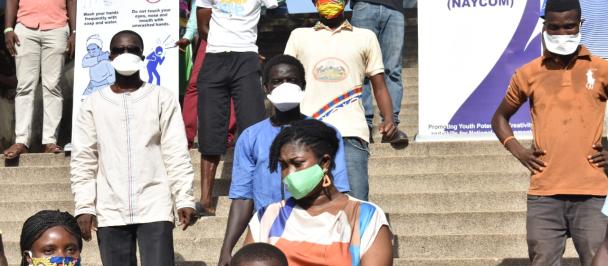Statement delivered by Haoliang Xu at the fifth anniversary of Youth Peace and Security #UNSCR2250 #Youth4peace #YPSanniversary
Fifth Anniversary of Youth Peace and Security
December 9, 2020
Dear Young Leaders, Excellencies, Ladies and Gentlemen,
At the outset, please allow me to acknowledge the Permanent Mission of Sweden and the Secretary-General’s Envoy on Youth, as well as all other co-conveners (the Permanent Mission of France, the Permanent Mission of the Dominican Republic, the Permanent Mission of Jordan, as well as UNFPA and DPPA/PBSO), for gathering us all today on the occasion of the fifth anniversary of landmark Security Council Resolution 2250 (2015) on youth, peace and security (YPS).
It is an honor for UNDP to co-host this timely high-level event and to champion this important agenda.
My remarks will focus on sharing a key milestone in our YPS journey as well as some lessons learned and promising practices, to help us collectively take stock and move forward.
The key milestone I would like to emphasize today is our first Youth Global Programme for Sustainable development and peace “Youth-GPS”. This first comprehensive programmatic offer, entirely dedicated to promoting the role of youth as positive agents of change, was launched in 2016, soon after the adoption of Security Council Resolution 2250. It includes an explicit focus on Youth, Peace and Security and is articulated around both a multi-dimensional approach, acknowledging the complex youth development challenges, and a multi-level approach, in recognition of the many levels and contexts in which UNDP operates.
I am pleased to report that the UNDP youth global programme has already:
- Mobilized interest and support from a broad range of donors and partners - Sweden, Denmark, Norway, Italy and Mexico, and helped inform member states’ priorities and shape and implement strategic responses;
- Forged and nurtured new partnerships with youth organisations, movements and networks, and advocated for such partnerships to become a criterion for the allocation of funding under the UNDP Funding Windows;
- Leveraged UNDP’s large and multi-thematic global network of practitioners, to effectively support and collaborate with over 100 field offices; for example, Sierra Leone, Jamaica, Yemen, Kosovo* and Pakistan;
- Enabled the co-hosting of unprecedented youth, peace and security consultations with young peacebuilders in the context of and as a follow-up to the ‘Missing Peace’ Progress Study;
- Supported the implementation of the UN PBF Gender and Youth Promotion Initiative, by moving the needle and encouraging the development of the next generation of projects that can advance youth agency;
- Designed, launched and implemented the first phase of the 16x16 initiative, by which UNDP supports and promotes the role young leaders play in advancing SDG16 in 16 countries;
- Convened an online global knowledge platform, called Youth4Peace.info, which is being relaunched today in a revamped format, as a YPS one-stop-shop knowledge platform for UN practitioners, young peacebuilders and governments and other partners;
- Explored frontier issues and systematically emphasized young people’s positive role as changemakers, for example, through our research on youth & prevention of violent extremism (UNDP Frontlines report, 2019).
Please allow me to offer some further reflections, from the perspective of our experience with policies and programmes:
- Reality shows that young people are still insufficiently taken into account in institutional and context analyses or fragility and conflict assessments. I sincerely hope that the United Nations YPS programming handbook that we are launching today will provide helpful advice on how to address this gap.
- More comprehensive youth and SDG16+ projects and programmes are needed, with an emphasis on youth participation as decision-makers, safe spaces for youth and the promotion of young people’s rights. The handbook also includes an entire chapter with entry points for programming and promising examples, under each of the five pillars of the resolution and with an emphasis on youth agency and leadership.
- As entities with a large presence in the field, having the ability to identify, access and deploy high-quality and agile capacities to respond to this new and high demand on youth, peace and security from the field is paramount. To strengthen our own capacities and deliver, UNDP has just launched its first roster of pre-vetted youth consultants as part of UNDP’s Global Policy Network’s One Roster, to enhance our work at all levels; and UNDP is also delighted to partner with FBA (Folke Bernadotte Academy) to deploy YPS secondees, starting with the UNDP Country Office in Ukraine in 2021.
Before concluding, I will illustrate how UNDP has meaningfully supported the role of youth in inclusive governance and peacebuilding. For example, in the context of the peace process in Colombia, the UNDP Manos a la Paz (MAP) initiative placed 1,220 young leaders in local municipalities, thereby strengthening local governance capacities for peace and increasing the engagement of young professionals in service delivery in the poorest and most conflict-affected areas.
Our sincere gratitude goes to our partners who are trusting and collaborating with us on a daily basis – thank you to the UN Peacebuilding Fund, UN entities, our bilateral donors and partners, and all youth organizations, movements and networks we join forces with and learn from around the globe.
UNDP strongly believes in the power of young people and is firmly committed to continuing to invest in their leadership and positive contribution to sustainable development and peace.
Thank you!

 Locations
Locations
